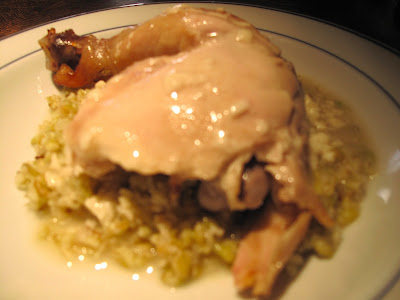I discovered Freekeh during my last visit to Lebanon (click HERE to read).
As I mentioned then, Freekeh originated in 2300 BC when wheat in a Phoenician village was burnt and the inhabitants rubbed the burnt wheat and found ripened grain.
I did not even think of bringing some with me. But a visit to an Iranian store in the West End put me face to face with a made-in-Lebanon box of Freekeh.
Now what to make with it. I have no recipes nor is it something I ate as I grew up.
So I decided to cook it in chicken broth as I do rice. The smell of something burning haunted me until I realized that it is the smell of Freekeh given it is really burnt wheat.
I made a light cheese sauce just like the one I tried in Lebanon. A roasted chicken topped the Freekeh and all covered with sauce. It was really good.
As I mentioned then, Freekeh originated in 2300 BC when wheat in a Phoenician village was burnt and the inhabitants rubbed the burnt wheat and found ripened grain.
I did not even think of bringing some with me. But a visit to an Iranian store in the West End put me face to face with a made-in-Lebanon box of Freekeh.
Now what to make with it. I have no recipes nor is it something I ate as I grew up.
So I decided to cook it in chicken broth as I do rice. The smell of something burning haunted me until I realized that it is the smell of Freekeh given it is really burnt wheat.
I made a light cheese sauce just like the one I tried in Lebanon. A roasted chicken topped the Freekeh and all covered with sauce. It was really good.























































